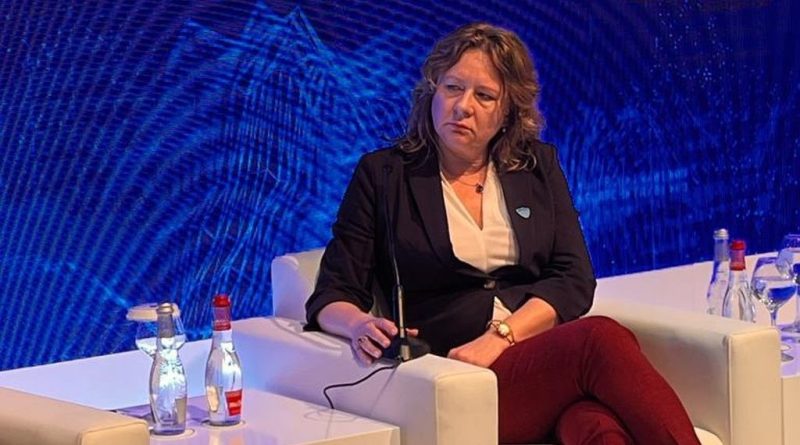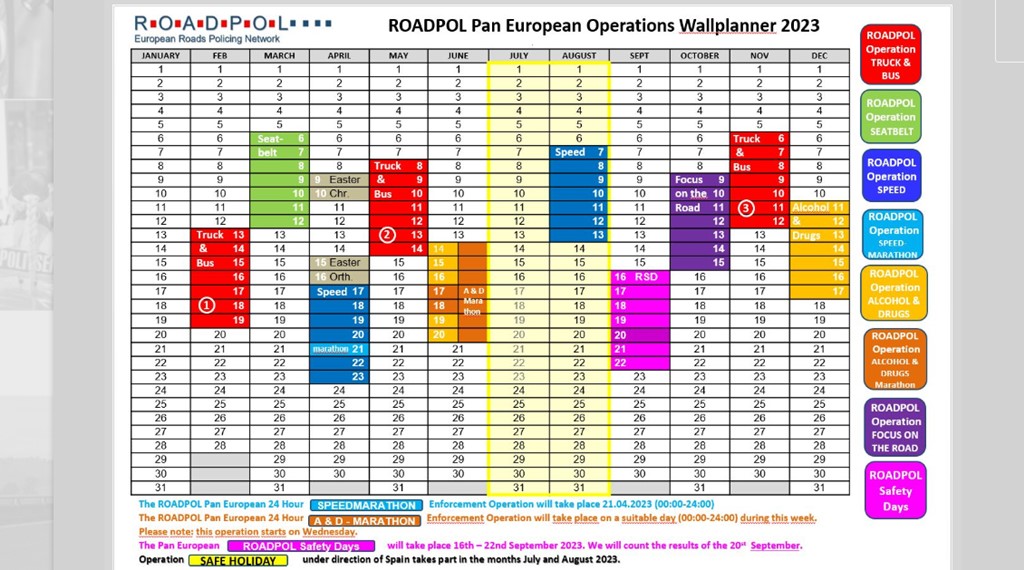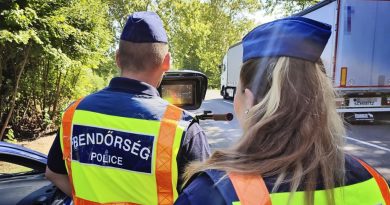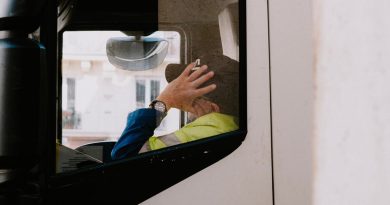Sanja Veić, General Secretary ROADPOL – Tachograph controle necessitates trained police force
Whenever ROADPOL is mentioned, the first thing that springs to mind of carriers is usually Truck&Bus operations, or as truck drivers sometimes say – “hell weeks”. These controls aimed at commercial traffic are only part of the activities carried out by the European Roads Policing Network. Today, ROADPOL has 31 member states, including Serbia. It is also one of the leading international organizations in the field of road safety and only one comprised of active police officers.
An interesting fact about this organization is that since last year its leadership has been mostly comprised of women. One of them is Croatia-born Sanja Veić, who took over the General Secretary post at ROADPOL from October last year.
In an interview for the PlutonLogistics portal, Sanja Veić talks about how the European Roads Policing Network functions, cooperation between its members, specifics when it comes to the control of cargo vehicles, and why “tachograph experts” are important. Our interlocutor, who has 25 years of experience as a police inspector of the Croatian Ministry of Interior, was also a member of several expert bodies of the European Commission. Also, she actively participated in ROADPOL’s development for more than a decade before assuming her current position.
PL: Let’s start with you telling us a little more about the organization of the network itself and the membership.
– ROADPOL has several membership options, from full membership, which includes the possibility to vote, all the way to observer status. We currently have 31 member states, each of which delegates one representative to the Council and one to the Operational Group. The only condition for representatives to be delegated is that they are police officers active at the national level. We have a statute on the basis of which we operate.
The Executive Committee, i.e. the management of ROADPOL, consists of 7 members – President, Vice president, General Secretary, Head of the operational group, as well as 3 Council representatives. By the way, the first four listed positions are currently held by women. Also, although ROADPOL is active on the territory of Europe, we are not limited to this territory only, and non-European countries can also become members.
We cooperate with a large number of partner organizations, where the European Commission and its Directorate General for mobility and transport – DG MOVE indubitably take the first place. We are partially financed by DG MOVE, through their projects. The rest of the funding is based on the membership fee.
PL: How are ROADPOL activities planned?
– We organize focused checks on the most common traffic violations – speeding, driving under the influence of alcohol or drugs, not wearing seat belts, etc. Everything takes place as per the calendar manned by the Operational Group. The calendar is adopted in the fall for every upcoming year and distributed to the states, which then carry out the actions at the same time, in a synchronized manner. Upon completion, they enter their individual results on our website. We then consolidate the results and publish them on our website and on the social media.
In addition to our goal of reducing the number of traffic accidents, as well as the number of injuries and casualties, our goal is also to exchange good practices between member states. For this purpose, we also organize diverse thematic seminars and workshops.
PL: One such seminar is the masterclass on tachographs, recently held in Zagreb, which was attended by police representatives from 15 countries. Can you share more details about it?
– ROADPOL has two experts – Frederik Martin from Belgium and Sven Kilian from Germany, who are highly specialized in the field of tachographs, i.e. the traffic of heavy good vehicles and buses. During the year, in cooperation with Euro Contrôle Route or independently – as was the case now in Zagreb, they hold masterclass events.
Such workshops serve to improve the knowledge of police officers in this very specific area. Specifically, when it comes to the control of tachographs, it is necessary to have a police force that is adequately educated on how to implement it and how to spot violations. It is not as simple and obvious as, for example, determining the speed of movement with the help of a camera.
Masterclass participants always have practical training, where they “practice” how to detect manipulations and violations in the field. Furthermore, they also learn what kind of events can happen in practice. This is where Frederik and Sven are particularly active, as they constantly follow all the activities on the ground throughout Europe, in order to be one step ahead of the criminals who, unfortunately, are always looking for new solutions and new tools for manipulation.
PL: The results of Truck&Bus controls show that the rate of detected violations is significantly higher for trucks than it is the case for buses – during the last action, for example, 24.01% of freight traffic violations were detected, while only 4.67% of bus-related violations. At the same time, we must note that a significantly larger number of trucks are controlled when compared to buses – in this case, for example, we are talking about a figure of 142,732 versus 92,403. Why is that the case?
– First of all, it’s because there is more freight traffic. Of course, there are differences depending on the country, however, considering that we do not analyze by individual members, but exclusively do an overall analysis, freight traffic is dominant, thus it is significantly more included in controls.
A very important reason could also be that regular and proper checking of heavy transport takes at least 20 minutes per vehicle. When it comes to a truck, it is inconvenient for the driver, but in most cases, it does not affect the goods being transported. When it comes to buses, the driver is not the only one involved in the process, but also about 50 other people who have to wait while the control is carried out. While it is taking place, the passengers must remain on the bus, as you don’t want them strolling along the highway. Therefore, the police want to have a very good signal that something is wrong before they embark on a thorough check of a bus transporting passengers.
PL: What are the most common offenses involving cargo vehicles?
– During the last Truck&Bus operation, held in May, the most common violations were exceeding driving and resting time, inadequate handling, i.e. manipulation of the tachograph, speeding, and technical issues, including overloaded vehicles and unsecured cargo. I would like to point out that certain actions – such as this one – are organized in cooperation with the ELA (European Labor Authority), which deals with social rules within the EU.
PL: It is clear that tachograph manipulation, as well as the exceeding of driving time, often occurs due to the evident pressure in the transport industry. How can such violations be prevented? Does ROADPOL have any additional actions in the plan?
– Yes, due to competition, some transport companies force drivers to break the rules – to arrive at their destination earlier, to unload earlier, to take on a new job before others…
How can you stop that? Primarily through the more intensive involvement of ELA in the controls, which I already mentioned, as a body with the authority to punish the transport company (cf. in the European Union) and the responsible person in the company, because it “forced” the driver to commit a violation. The police alone cannot do it, so the cooperation between authorities is crucial.
I will give a comparison, specifically in Croatia, you have the Ministry of Labor, pension system, family, and social policy with their inspection and as far as I know in Serbia, Road traffic safety agency. In this case, ELA is something like the Road traffic safety agency or labor inspection, only at the EU level. Also, ROADPOL and ELA enter all the data and results of the action through a joint platform, in order to draw attention and influence carriers not to force drivers to violate regulations.
It is clear how much of a threat a tired driver poses to safety on roads, involving passenger vehicles, and especially when it comes to commercial vehicles. This is precisely why we have the largest number of Truck&Bus operations in our calendar – three per year.
PL: How standardized are the national police when it comes to such controls?
– ROADPOL created tables for operations, not only for commercial transport but also for other actions. We standardized the form and violations that are controlled and entered into it – among them, for example, in the case of trucks – unsecured cargo, speeding, not wearing a seat belt, technical defects, not respecting working hours, overload, etc. Of course, there is also the “other” section, for the rest of offences not specified in the table. Also, if you want to add or highlight something specific, it’s possible to write such a note.
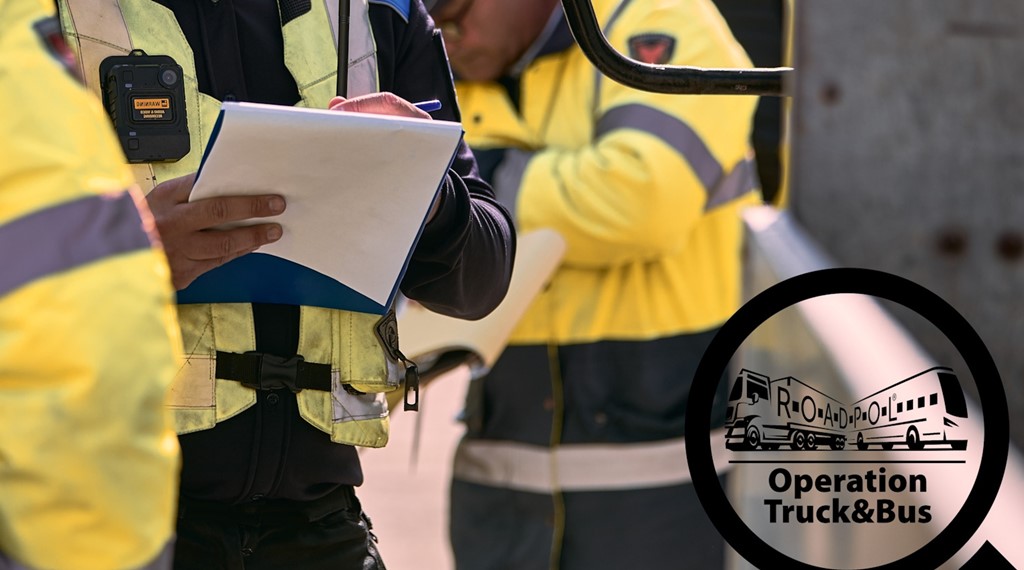
PL: Do the members of the ROADPOL network have any obligation or standard regarding the number of controlled vehicles?
– No, because each country has different police work plans. Therefore, everyone carries out the action during a certain week, but we cannot define or obligate them to carry out a specific number of controls during that period. Everything is done on a voluntary basis. On the other hand, I believe that for many countries that used to carry out only a small number of the mentioned controls, such actions meant that they increased that number.
PL: I assume that the new regulation related to the obligation to use smart tachographs of the second generation will bring ROADPOL experts new tasks and challenges?
– We will certainly include the new regulation in our plans for the next year and attempt to fill in the members into all the changes concerning that plan.
PL: How active is Serbia in ROADPOL?
Serbia is very active and I only have words of praise for my colleagues who try to participate in all our events.
We also have our own Forum – on our website part reserved for members where country representatives’ can directly ask questions related to legislation, technology, or anything else in our field, and Serbia is also extremely active there. Colleagues from your country are trying to pull together as many solutions as possible from countries that have a better road safety situation.
The forum also helps us all a lot, there are always expert, precise questions. One of the more recent ones, for example, read: “If you use drug testers, do you record both positive and negative results?” In a very short time, you get an answer from many countries, you don’t have to do your own research.
PL: How do you see the role of ROADPOL in the future?
– I hope that we will expand our influence in other parts of the world, not only in Europe, so that we can work together to improve traffic safety and education elsewhere as well. We have just come from a workshop in Saudi Arabia, where we were invited to present our experiences.
Also, the Dubai Police currently has observer status within the network.
We would like to include countries worldwide to join effort to reduce fatalities and serious injuries in road crashes. Our flagship campaign ROADPOL Safety Days which we organize every year in September, during EU Mobility Week, is good example of raising awareness amongst all road users and call for road traffic authorities, Ministries, private companies, NGO’s as well as every citizen to think about risks in traffic and adopt their behavior according to traffic rules or conduct activity which would raise road safety on the higher level.
(cover photo – Copyright © Sanja Veic 2023)


